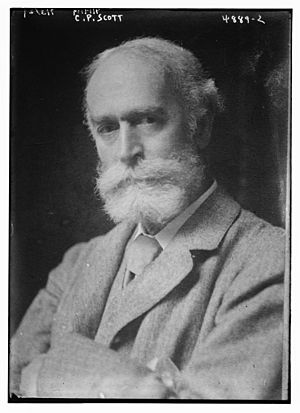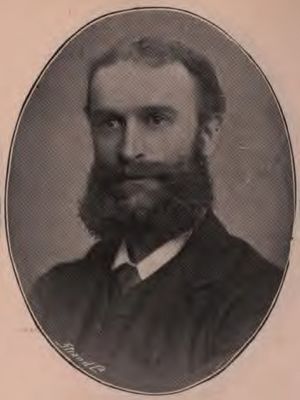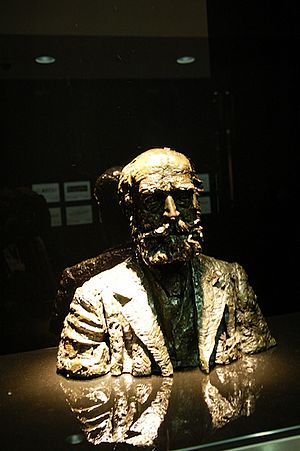C. P. Scott facts for kids
Quick facts for kids
C. P. Scott
|
|
|---|---|

Scott in 1919
|
|
| Born |
Charles Prestwich Scott
26 October 1846 Bath, Somerset, England
|
| Died | 1 January 1932 (aged 85) |
| Alma mater | Corpus Christi College, Oxford |
| Occupation | Journalist, editor |
| Spouse(s) | Rachel Cook (1874–1905) |
| Children | Madeline Scott Laurence Scott John Russell Scott Edward Taylor Scott |
Charles Prestwich Scott (born October 26, 1846 – died January 1, 1932), often called C. P. Scott, was an important British journalist, newspaper owner, and politician. He was born in Bath, England. Scott was the editor of the Manchester Guardian newspaper (which is now called the Guardian) for a very long time, from 1872 to 1929. He also owned the newspaper from 1907 until he passed away. Besides his work in newspapers, he was a Liberal Member of Parliament (MP). He used his newspaper to support ideas that were considered modern and fair for his time.
Biography of C. P. Scott
Scott's Early Life and Education
C. P. Scott went to school at Hove House and Clapham Grammar School. Later, he studied at Corpus Christi College, Oxford, a famous university. He did very well in his studies, especially in a subject called "Greats" (which included classical languages and philosophy). After university, in 1870, he went to Edinburgh to learn about working for a newspaper at The Scotsman.
While he was at Oxford, his cousin, John Taylor, who worked for the Manchester Guardian, thought the newspaper needed a new editor in Manchester. He offered the job to Scott. Scott already had family ties to the newspaper. Its founder, John Edward Taylor, was his uncle. Also, Scott's father, Russell Scott, had owned the paper for a time before selling it back to the Taylor family. Scott accepted the offer and started working for the Manchester Guardian in London in February 1871. He became the main editor on January 1, 1872.
When Scott first became editor, the Manchester Guardian followed a moderate political line. However, things changed in 1886 when some politicians split from the Liberal Party. Scott's newspaper then moved more to the left. It supported Gladstone and the idea of Home Rule for Ireland, which meant Ireland would have more control over its own affairs.
Scott's Time in Parliament
In 1886, Scott first tried to become a Member of Parliament (MP) for the Liberal Party. He didn't win that election, but he tried again in 1891 and 1892. He was finally elected as an MP for Leigh in the 1895 election. This meant he spent a lot of time in London when Parliament was meeting.
Being both an MP and the editor of an important Liberal newspaper made him a very influential person in politics. He was re-elected in the 1900 election, even though the Guardian had taken an unpopular stand against the Second Boer War. Scott decided to leave Parliament in 1906. This was when the Liberal Party won a huge election, and Scott was busy with the difficult process of buying the newspaper he edited.
Becoming the Owner of the Manchester Guardian
In 1905, the owner of the Manchester Guardian, Edward Taylor, passed away. His will said that C. P. Scott should be offered the chance to buy the newspaper's copyright for £10,000. It also suggested that Scott should be offered the newspaper's offices and printing works at a fair price. However, the people in charge of Taylor's estate didn't have to sell it to Scott. They could have continued to run the paper themselves.
One of the people managing the estate was Taylor's nephew, who would make money if Scott had to pay a higher price. Another was the Manchester Guardian's manager, who might lose his job if Scott took over. Because of this, Scott had to pay a lot of money to buy the paper. He paid a total of £240,000. He got large loans from his sisters and from Taylor's widow, who supported him. Scott also bought Taylor's other newspaper, the Manchester Evening News, in 1922 and took full control of it in 1929.
Scott's Political Views and Government Connections
Scott used his newspaper to speak out against Britain entering World War I. He also talked to government leaders about his views. His newspaper articles said that going to war would be a "crime against Europe." They warned that it would "throw away the accumulated progress of half a century." On August 4, 1914, the day the king declared war, David Lloyd George told Scott that the situation had changed because Germany had invaded Belgium.
Even though Scott was a Liberal his whole life, he sometimes had disagreements with Lloyd George, who later became Prime Minister. Scott was known for introducing important people to each other. For example, he introduced Chaim Weizmann, a Jewish leader, to Lloyd George. Scott also had friendships with other important people, including Winston Churchill. He often met with his friends at clubs like the Reform Club. His closest political friend was the Irish leader John Dillon. They both believed in self-governance for Ireland, peace, and women's rights.
Scott's Role as a Senior Journalist
Under Scott's leadership, the Guardian continued to grow and became a very important newspaper. Scott was responsible for hiring talented journalists. For example, he hired Robert Dell to report from Paris. Dell's weekly column shared secret negotiations and important news from France. Scott's opinions were often sought by government officials on various topics, including public opinion in Ireland.
Scott's Beliefs on Journalism
In 1921, when the Manchester Guardian celebrated its 100th birthday, Scott wrote an essay about what he believed a newspaper should be. He said that the most important job of a newspaper is to report news accurately. He famously wrote, "comment is free, but facts are sacred." This means that while opinions can be freely expressed, the facts must always be correct. He also said that even opinions in a newspaper should be fair. Scott believed a newspaper should have its own "soul" and that its staff should work towards a "common ideal." He thought that while the business side of a newspaper was important, it shouldn't be the most important thing, or there would be "distressing consequences."
Scott supported women's right to vote. However, he was not in favor of the more extreme actions taken by some suffragettes. He believed their methods could harm their cause. He was also concerned about the General Strike of 1926, wondering if it was a fair way to solve industrial problems.
Scott was also a supporter of Zionism, which was the movement to create a Jewish homeland.
Scott's Final Years
C. P. Scott remained the editor of the Manchester Guardian until July 1, 1929. At that time, he was 83 years old and had been the editor for 57 and a half years! His youngest son, Ted Scott, took over as editor. However, C. P. Scott remained the head of the company and often visited the Guardian offices in the evenings. He passed away early on New Year's Day in 1932.
Scott's Family Life
In 1874, Scott married Rachel Cook. She was one of the first women to study at the College for Women, Hitchin (which later became Girton College, Cambridge). She died while the family was dealing with the dispute over Edward Taylor's will. Their daughter, Madeline, married Charles Edward Montague, who was a long-time writer for the Guardian. Scott's oldest son, Laurence, died young at 31 in 1908 from tuberculosis. His middle son, John, became the Manchester Guardian's manager and later created the Scott Trust, which now owns the newspaper. His youngest son, Ted, who became editor after his father, sadly drowned in a sailing accident less than three years after taking the job. John and Ted Scott had jointly inherited ownership of the newspaper company. After Ted's death, John passed the ownership to the Scott Trust.
In 1882, Scott moved into a house called The Firs in Fallowfield, Manchester. This house was leased to him by his friend, Sir Joseph Whitworth. After Scott's death, the house became part of the University of Manchester. Scott used to ride his bicycle to his office.
C. P. Scott was the grandfather of Evelyn Montague (1900–1948). Evelyn was an Olympic athlete and journalist who was featured in the film Chariots of Fire. Like his grandfather, Evelyn wrote for the Manchester Guardian and became its London editor.
Honours and Recognition
In 1930, C. P. Scott was given the special title of Freeman of the City of Manchester. This is a great honour given to people who have done a lot for the city.



